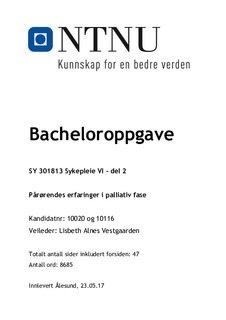| dc.contributor.advisor | Vestgaarden, Lisbeth Alnes | |
| dc.contributor.author | Bjørdal, Jeanette Busch | |
| dc.contributor.author | Falldalen, Anne-Berit Tayech | |
| dc.date.accessioned | 2017-10-25T13:01:51Z | |
| dc.date.available | 2017-10-25T13:01:51Z | |
| dc.date.issued | 2017 | |
| dc.identifier.uri | http://hdl.handle.net/11250/2462145 | |
| dc.description.abstract | Hensikt: Oppgavens hensikt er å belyse hvilke erfaringer pårørende til palliative
kreftpasienter har fra møte med sykepleieren på sykehuset. Dette kan gi kunnskap om
hvordan sykepleier kan ivareta pårørende i en slik situasjon.
Metode: Det ble utført et systematisk litteratursøk i to databaser. Fem kvalitative artikler,
to kvantitative artikler og en oversiktsartikkel ble analysert med utgangspunkt i
analysemodellen i Evans artikkel.
Resultat: Pårørende erfarte at tillit til sykepleieren og kontinuitet rundt pleien var viktig for
følelsen av trygghet. Informasjon rundt pasientens helsetilstand ble opplevd som svært
viktig, og kunne redusere stress og bekymringer. Mangel på informasjon kunne oppleves
som belastende. Pårørende erfarte at pasientens behov gikk foran sine egne.
Tilstedeværelse, smertelindring og det å bidra ble opplevd spesielt viktig. Pårørende
opplevde også et behov for emosjonell støtte, noe som kunne hjelpe de med å takle
situasjonen.
Konklusjon: Å føle trygghet, å få nok informasjon, pasientrelaterte behov og pårørendes
egne behov ble erfart som spesielt viktige tema for pårørende. Sykepleieren må derfor
kunne skape tillit og trygghet hos pårørende. Videre må sykepleieren anerkjenne og dekke
pårørendes behov for informasjon. Sykepleieren må også kunne dekke andre behov som
pårørende har, både de behovene som er tilknyttet pasienten og de behovene som
pårørende har personlig. | nb_NO |
| dc.description.abstract | Aim: The aim of this study is to look into the experiences of the relatives of cancer patients
receiving palliative care at the hospital. This can bring up new knowledge about how the
nurses can help relatives in these situations.
Method: A systematic literature search was performed in two databases. Five qualitative,
two quantitative and one review article was analysed using the analytical principle
described by Evans.
Result: Relatives experienced that trust in the nurses and continuity of care as important
for their safety. Information about the patient's condition was also experienced as very
important, and this could reduce their stress and concerns. Not enough information could
be a strain. Relatives experienced that the patient's needs were more important than their
own. Being present, pain management and contributing was experienced as important.
Relatives also had a need for emotional support, which could help them in the situation.
Conclusion: Feeling safe, getting information, patient related needs and the relatives’
personal needs were experienced as important themes for the relatives. The nurse therefore
has to create trust and safety for the relatives. The nurse has to recognize and address the
relatives need for information. The nurse also has to address all the needs that the relatives
have, both the patient related needs and the relatives own personal needs. | nb_NO |
| dc.language.iso | nob | nb_NO |
| dc.rights | Attribution-NonCommercial-NoDerivatives 4.0 Internasjonal | * |
| dc.rights.uri | http://creativecommons.org/licenses/by-nc-nd/4.0/deed.no | * |
| dc.subject | Palliative fase | nb_NO |
| dc.subject | Kreftpasient | nb_NO |
| dc.subject | Sykepleier | nb_NO |
| dc.subject | Sykehus | nb_NO |
| dc.title | Pårørendes erfaringer i palliativ fase | nb_NO |
| dc.type | Bachelor thesis | nb_NO |
| dc.subject.nsi | VDP::Medisinske Fag: 700::Helsefag: 800::Sykepleievitenskap: 808 | nb_NO |
| dc.source.pagenumber | 47 | nb_NO |

